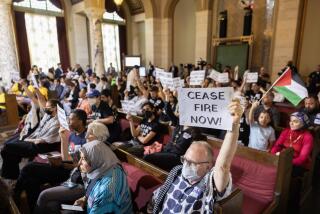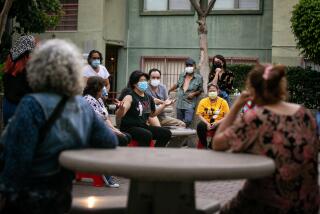Occupy L.A. takes its fight to foreclosure auction
Several times a week, a group of investors gathers in Norwalk to bid on homes that have been foreclosed.
The midmorning auction outside the Los Angeles County Superior Court building is a high-stakes, but usually low-key affair. On Friday, bidders sat in the sun in lawn chairs, and the auctioneer looked relaxed in a pair of baggy sweat pants.
But just as the auction was getting started, a commotion erupted from across the lawn. It was a group of protesters, marching with posters and howling an angry chant. “Banks got bailed out / We got sold out!”
Some wore T-shirts identifying themselves as members of local labor unions. Others wore arm bands printed with “99%” — a now-famous reference that revealed a different allegiance.
Occupy L.A. may have lost its home outside City Hall this week, but protesters plan to continue the acts of civil disobedience that helped the movement capture national attention.
Demonstrations against the foreclosure process may be key among them, said one protester who spent nearly two months living on the City Hall lawn at Occupy L.A., and who hitched a ride to Norwalk to take part in Friday’s action.
The protester, Abe, wouldn’t give his last name, but said anger at the foreclosure crisis, and at banks that he believes haven’t done enough to help homeowners get more favorable loans, helped draw him to Occupy in the first place.
Friday’s protest was organized in conjunction with Good Jobs L.A., a coalition of labor unions and other community organizations. Although some within the Occupy movement have expressed fears that their protest may be co-opted by other groups — including unions — Abe said he isn’t worried about that.
“I don’t think we should align with any power structure,” he said. “But anyone who wants to stand in solidarity with us, we’re happy to have them.”
As the protesters circled the auction, the bidders drew closer so they could hear over chants of “Shame on you!”
On the auction block this day were properties from throughout the county — from Torrance to Van Nuys. Next up was a home on West 59th Place in South L.A.
The protesters booed. The bidding started. “Do I have $113,300?” the auctioneer asked. He is hired to sell the properties by the banks and title companies that own the homes.
“$115,000” said one man.
“$116,000,” said another.
The price climbed and climbed. When it hit $130,000, protester Carlos Marroquin started shouting.
“Whose home is that? Whose home are you buying?” he yelled. “Do you know that families are breaking apart? People fought for those homes, and you guys are just taking them away.”
Marroquin, who lost his own home to foreclosure, said he speaks from experience. “It destroyed my marriage and hurt my kids,” he said.
A member of Occupy L.A. since its Oct. 1 beginning, he set up a tent there and said he helped counsel 300 families facing foreclosure.
At first, bidders seemed amused by the hubbub — and the news reporters and photographers it had attracted.
“I kind of like it,” one said to another. “I like crazy, though.”
But as the morning wore on, and one protester held a microphone up to an amplification system, producing a deafening squeal, the bidder’s patience wore down. “They’re getting annoying,” he said.
Another bidder, Mike Lalani, told protesters that the buyers were the wrong target.
“Your protest is good, it’s great, but it’s misguided,” he said. “You need to be saddened that these homes are being lost in the first place.”
The auctioneer agreed: “You guys need to go higher on the food chain.”
They have, of course. Last month, police arrested dozens of protesters in demonstrations in downtown’s financial district, including one at Bank of America plaza.
At that protest and elsewhere, protesters have deployed tents — a symbol of the Occupy L.A. encampment — in their demonstrations.
A tent made an appearance Friday, when protesters offered to sell it to the bidders. A vigorous bidding war broke out. The final price: $20.
More to Read
Sign up for Essential California
The most important California stories and recommendations in your inbox every morning.
You may occasionally receive promotional content from the Los Angeles Times.










